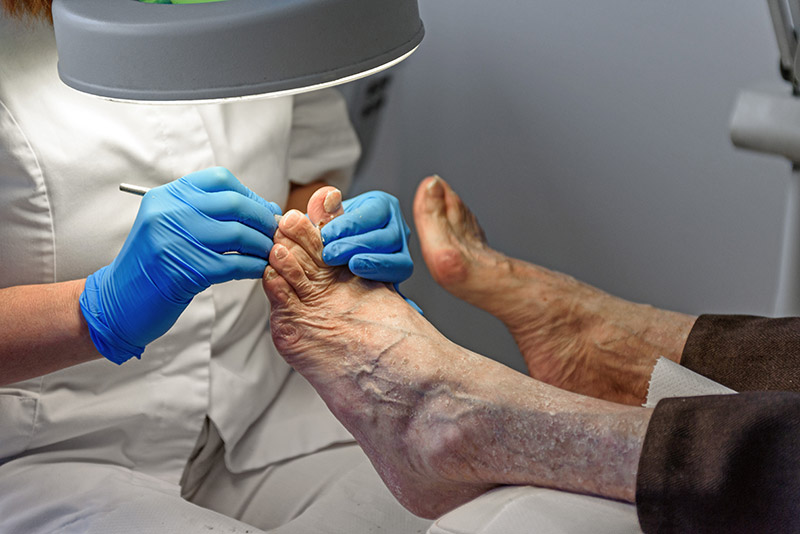
Diabetic Foot Care: Why It Matters More Than You Think
When you have diabetes, you likely focus on your blood sugar, medications, and diet. But your feet also deserve attention. Diabetes can silently affect your foot health in serious ways, even leading to infections or amputations if not properly managed.
In this article, Dr. Praveen Kumrah, medical director of podiatry at Essen Health Care, shares his expert insights into how diabetes impacts foot health and how you can stay ahead of complications. In this article, he’ll walk us through the most common problems to watch for and the importance of regular check-ups. Additionally, you’ll learn how podiatrists can help you protect your mobility and manage your diabetes.
How Diabetes Affects Your Feet
Understanding how diabetes impacts your foot health is critical for prevention. High blood sugar levels over time can cause nerve damage and reduce blood flow, making your feet especially vulnerable to complications that impact your mobility and overall foot health.
According to Dr. Kumrah, people with diabetes can experience:
Diabetes can damage nerves, especially in the feet. This can cause numbness, tingling, or a total loss of sensation, making it hard to notice injuries or irritation.
Reduced blood flow means wounds heal more slowly and infections are harder to fight off, increasing the risk of complications.
Nerve damage can affect the muscles in your feet, causing changes in shape, such as hammertoes or Charcot foot. These make it harder to walk and increase pressure points.
Diabetes can lower your immune defenses, making it easier for fungal infections to grow, especially in the nails or between the toes.
Uneven pressure or friction can lead to thickened skin. If left untreated, these can develop into open sores or ulcers that are slow to heal.
If left untreated, these conditions can increase the risk of serious infections or even lead to amputation. This is why education, early detection, and routine podiatric care are crucial for individuals managing diabetes.
Why Regular Check-Ups Are So Important
While your feet may feel fine, diabetes-related foot problems can develop quietly over time. Many of these issues are preventable with regular check-ups, proper foot care, and early detection.
Dr. Kumrah outlines why staying on top of your foot health can make a big difference:
- Catch problems early: Small changes like redness or swelling can be treated before they get worse.
- Monitor nerve and blood flow: Exams check for neuropathy and poor circulation.
- Prevent wounds and ulcers: Podiatrists find pressure points and shoe issues to avoid skin breakdown.
- Get personalized care: Receive guidance like custom insoles, daily care tips, and treatment for infections or calluses.
- Stay mobile and healthy: Healthy feet help you stay active and lower your risk of serious complications.
Even if your feet feel fine today, that doesn’t mean problems aren’t developing under the surface. Taking a proactive approach through regular check-ups and proper foot care can help you avoid serious complications in the future.

Why You Need a Podiatrist on Your Diabetes Care Team
If you have diabetes, a podiatrist should be a regular part of your healthcare team. Diabetes can silently cause damage to your feet through two main pathways: reduced blood flow and nerve damage. Over time, this combination can lead to serious issues—like cuts or blisters that don’t heal, infections, ulcers, and even amputations.
What makes foot care tricky for people with diabetes is that problems often go unnoticed until they become severe. That’s because nerve damage can reduce your ability to feel pain, pressure, or temperature changes. You might not notice a pebble in your shoe, a small blister from a new pair of shoes, or even a wound that’s becoming infected.
This is where a podiatrist plays a critical role. At every visit, they perform thorough foot exams to check your circulation, nerve function, skin condition, and nail health. They’re trained to detect early signs of trouble that might otherwise go overlooked. A podiatrist can also provide expert treatment for common issues like fungal infections, thick nails, corns, and calluses, which can all worsen quickly in diabetic feet. Beyond treatment, they offer preventive care, helping you find properly fitting shoes, custom orthotics, and guidance on daily foot care routines tailored to your needs.
By having a podiatrist as part of your care team, you’re taking a crucial step to safeguard your long-term health and independence. Regular check-ups can reduce your risk of wounds, avoid emergency visits, and support better balance and mobility. Most importantly, your podiatrist works alongside your primary care doctor, endocrinologist, and other specialists to keep your diabetes well-managed from head to toe.
Small Steps Today, Lifelong Protection Tomorrow
Diabetic foot care isn’t just about avoiding discomfort; it’s about protecting your future health, independence, and quality of life. While managing blood sugar is essential, it’s only part of the picture. Your feet are often the first place where complications from diabetes can appear, and without proper attention, small problems can turn into serious risks.
The good news? Most of these issues are preventable. With regular check-ups, early intervention, and the support of a podiatrist, you can stay ahead of potential problems. A podiatrist brings a trained eye to detect changes you might not notice and offers personalized care to keep your feet healthy and strong.
If you have diabetes, don’t wait for a warning sign. Prioritize your foot health as part of your overall care plan. Staying proactive today can help you stay mobile, avoid serious complications, and lead a healthier, more confident life tomorrow.
About Dr. Praveen Kumrah, DPM

Dr. Praveen Kumrah, DPM, is a compassionate podiatrist and currently serves as the Medical Director for the Podiatry Division at Essen Health Care. A graduate of Barry University in Miami, Dr. Kumrah, completed his surgical residency at Our Lady of Mercy in the Bronx (now Montefiore Hospital). With over 20 years of experience in treating patients of all ages—from pediatrics to geriatrics—he is committed to providing personalized, expert care to meet the unique needs of each patient.